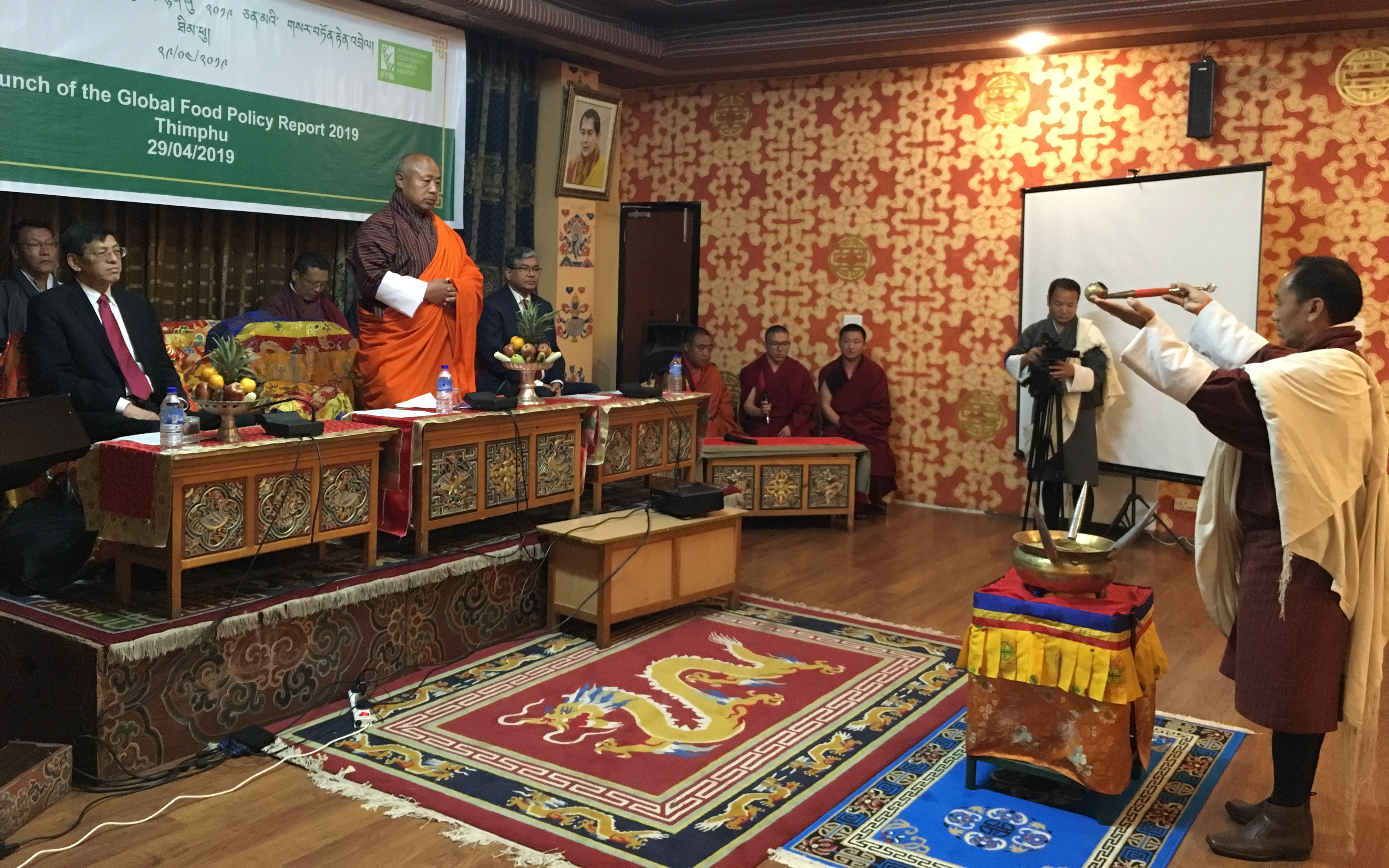Nestled in the Himalayas, the Kingdom of Bhutan places top priority on the happiness of its people, tracking well-being with its Gross National Happiness index. The world can learn from this concept, said experts at the Bhutan launch of IFPRI’s 2019 Global Food Policy Report (GFPR) launch in Thimphu April 29. Speakers laid out the opportunities and challenges in meeting the goals of food and nutrition security to achieve “happiness” and the UN Sustainable Development Goals (SDGs).
The launch started with the traditional Marchang (literally, Mar means butter and Chang means alcohol) ceremony which involves offering alcohol to the root and lineage gurus and guardian deities, invoking their blessings to remove any obstacles so that the work (the launch of the GFPR and the collaboration between IFPRI and the Ministry of Agriculture and Forests, in this case) can be fulfilled successfully.
Bhutan’s Minister for Agriculture and Forests Lyanpo Yeshey Penjor emphasized the need for expanding investments in agricultural research to guide both policy making and implementation. “The ultimate goal of Bhutan’s development efforts is Gross National Happiness, (but) to be happy, we can’t go hungry,” said Penjor. “We have to start our happiness by producing sufficient food for all.”
Agricultural production in Bhutan is restricted to less than 3% of the total land area, and the country utilizes a minimal amount of chemicals in the food production process, contributing to its vision of organic farming and sustainable food production.
“Countries across the globe can learn from Bhutan on how to prioritize happiness. Maximizing happiness is a goal everyone should aim for,” said IFPRI Director General Shenggen Fan. He also committed to revitalizing IFPRI’s engagement in Bhutan to support the country in building its vision for agricultural research and development.
Fan outlined the GFPR’s strategy for revitalizing rural areas with a focus on five building blocks to achieve SDGs, including: Creating farm and non-farm rural employment opportunities; achieving gender equality; addressing environmental challenges; improving access to energy; and investing in good governance.
Echoing those messages, Department of Livestock Director-General Tashi Samdrup said that poverty and malnutrition remain serious challenges in Bhutan, and there are no single answers or quick fixes to address these issues. “There’s no looking back, we have to move forward, and IFPRI’s report provides a ray of hope.”
One challenge is Bhutan’s high rate rural-urban migration. Farm profitability is low and other opportunities in rural areas are scarce. “While rural-urban migration is understood to be a universal phenomenon, as the country transforms from primary sector to secondary and tertiary sector [agriculture to manufacturing to services], the rate should be and can definitely be stemmed with good policies, strategies and adequate investments,” said Ugyen Penjore, director general of the Department of Agricultural Marketing and Cooperatives.
Even though Bhutan faces challenges posed by subsistence poverty and a high rate of youth unemployment, there are opportunities for growth and development, said Ganesh Chettri, an advisor with the Department of Agriculture.
Collaboration between IFPRI and Bhutan provides an opportunity to the global community to learn from each other, said P.K. Joshi, IFPRI’s former South Asia director and now senior advisor to the director general. IFPRI and Bhutan will be working on issues related to agricultural diversification from a cereal-based system to high-value commodities, horticulture and livestock, as well as on determining conditions for success, food safety issues, regulations, and building linkages between small farm holders and markets in the country. IFPRI will also assist the country in realizing its Vision 2045 national strategy, focusing on renewable resources, said Joshi.
Smita Aggarwal is an IFPRI Communications Specialist.







